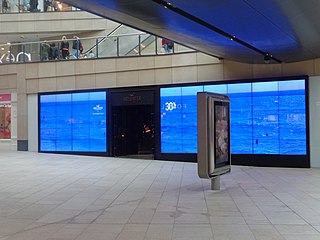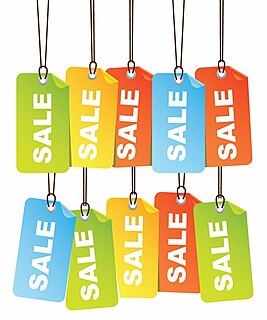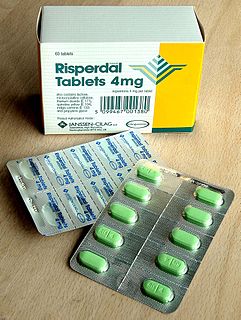
A collectable is any object regarded as being of value or interest to a collector. Collectable items are not necessarily monetarily valuable or uncommon. There are numerous types of collectables and terms to denote those types. An antique is a collectable that is old. A curio is a small, usually fascinating or unusual item sought by collectors. A manufactured collectable is an item made specifically for people to collect.

Sales are activities related to selling or the number of goods sold in a given targeted time period. The delivery of a service for a cost is also considered a sale.

Distribution is one of the four elements of the marketing mix. Distribution is the process of making a product or service available for the consumer or business user who needs it. This can be done directly by the producer or service provider or using indirect channels with distributors or intermediaries. The other three elements of the marketing mix are product, pricing, and promotion.
Sales promotion is one of the elements of the promotional mix. The primary elements in the promotional mix are advertising, personal selling, direct marketing and publicity/public relations. Sales promotion uses both media and non-media marketing communications for a pre-determined, limited time to increase consumer demand, stimulate market demand or improve product availability. Examples include contests, coupons, freebies, loss leaders, point of purchase displays, premiums, prizes, product samples, and rebates.

Pricing is the process whereby a business sets the price at which it will sell its products and services, and may be part of the business's marketing plan. In setting prices, the business will take into account the price at which it could acquire the goods, the manufacturing cost, the marketplace, competition, market condition, brand, and quality of product.
Discounts and allowances are reductions to a basic price of goods or services.

In marketing, a coupon is a ticket or document that can be redeemed for a financial discount or rebate when purchasing a product.

Packaging is the science, art and technology of enclosing or protecting products for distribution, storage, sale, and use. Packaging also refers to the process of designing, evaluating, and producing packages. Packaging can be described as a coordinated system of preparing goods for transport, warehousing, logistics, sale, and end use. Packaging contains, protects, preserves, transports, informs, and sells. In many countries it is fully integrated into government, business, institutional, industrial, and personal use.

Online shopping is a form of electronic commerce which allows consumers to directly buy goods or services from a seller over the Internet using a web browser or a mobile app. Consumers find a product of interest by visiting the website of the retailer directly or by searching among alternative vendors using a shopping search engine, which displays the same product's availability and pricing at different e-retailers. As of 2020, customers can shop online using a range of different computers and devices, including desktop computers, laptops, tablet computers and smartphones.

A receipt is a document acknowledging that a person has received money or property in payment following a sale or other transfer of goods or provision of a service. All receipts must have the date of purchase on them. If the recipient of the payment is legally required to collect sales tax or VAT from the customer, the amount would be added to the receipt, and the collection would be deemed to have been on behalf of the relevant tax authority. In many countries, a retailer is required to include the sales tax or VAT in the displayed price of goods sold, from which the tax amount would be calculated at the point of sale and remitted to the tax authorities in due course. Similarly, amounts may be deducted from amounts payable, as in the case of taxes withheld from wages. On the other hand, tips or other gratuities that are given by a customer, for example in a restaurant, would not form part of the payment amount or appear on the receipt.
A use tax is a type of tax levied in the United States by numerous state governments. It is essentially the same as a sales tax but is applied not where a product or service was sold but where a merchant bought a product or service and then converted it for its own use, without having paid tax when it was initially purchased. Use taxes are functionally equivalent to sales taxes. They are typically levied upon the use, storage, enjoyment, or other consumption in the state of tangible personal property that has not been subjected to a sales tax.
Lemon laws are laws that provide a remedy for purchasers of cars and other consumer goods in order to compensate for products that repeatedly fail to meet standards of quality and performance. Although many types of products can be defective, the term "lemon" is mostly used to describe defective motor vehicles, such as cars, trucks, and motorcycles.
A rebate is a form of buying discount and is an amount paid by way of reduction, return, or refund that is paid retrospectively. It is a type of sales promotion that marketers use primarily as incentives or supplements to product sales. Rebates are also used as a means of enticing price-sensitive consumers into purchasing a product. The mail-in rebate (MIR) is the most common. A MIR entitles the buyer to mail in a coupon, receipt, and barcode in order to receive a check for a particular amount, depending on the particular product, time, and often place of purchase. Rebates are offered by either the retailer or the product manufacturer. Large stores often work in conjunction with manufacturers, usually requiring two or sometimes three separate rebates for each item, and sometimes are valid only at a single store. Rebate forms and special receipts are sometimes printed by the cash register at time of purchase on a separate receipt or available online for download. In some cases, the rebate may be available immediately, in which case it is referred to as an instant rebate. Some rebate programs offer several payout options to consumers, including a paper check, a prepaid card that can be spent immediately without a trip to the bank, or even as a PayPal payout.
A pre-order is an order placed for an item that has not yet been released. The idea for pre-orders came because people found it hard to get popular items in stores because of their popularity. Companies then had the idea to allow customers to reserve their own personal copy before its release, which has been a huge success.

Reuse is the action or practice of using an item, whether for its original purpose or to fulfill a different function. It should be distinguished from recycling, which is the breaking down of used items to make raw materials for the manufacture of new products. Reuse – by taking, but not reprocessing, previously used items – helps save time, money, energy and resources. In broader economic terms, it can make quality products available to people and organizations with limited means, while generating jobs and business activity that contribute to the economy.
A cereal box prize, also known as a cereal box toy in the UK and Ireland, is a form of advertising that involves using a promotional toy or small item that is offered as an incentive to buy a particular breakfast cereal. Prizes are found inside or sometimes on the cereal box. The term "cereal box prize" is sometimes used as a broader term to also include premiums that can be ordered through the mail from an advertising promotion printed on the outside of the cereal box.
Loyalty marketing is an approach to marketing, based on strategic management, in which a company focuses on growing and retaining existing customers through incentives. Branding, product marketing, and loyalty marketing all form part of the customer proposition – the subjective assessment by the customer of whether to purchase a brand or not based on the integrated combination of the value they receive from each of these marketing disciplines.

In retail, a product return is the process of a customer taking previously purchased merchandise back to the retailer, and in turn receiving a refund in the original form of payment, exchange for another item, or a store credit.
In business and marketing, “trade” refers to the relationship between manufacturers and retailers. Trade Promotion refers to marketing activities that are executed in retail between these two partners. Trade Promotion is a marketing technique aimed at increasing demand for products in retail stores based on special pricing, display fixtures, demonstrations, value-added bonuses, no-obligation gifts, and more.
In marketing, premiums are promotional items — toys, collectables, souvenirs and household products — that are linked to a product, and often require proofs of purchase such as box tops or tokens to acquire. The consumer generally has to pay at least the shipping and handling costs to receive the premium. Premiums are sometimes referred to as prizes, although historically the word "prize" has been used to denote an item that is packaged with the product and requires no additional payment over the cost of the product.









